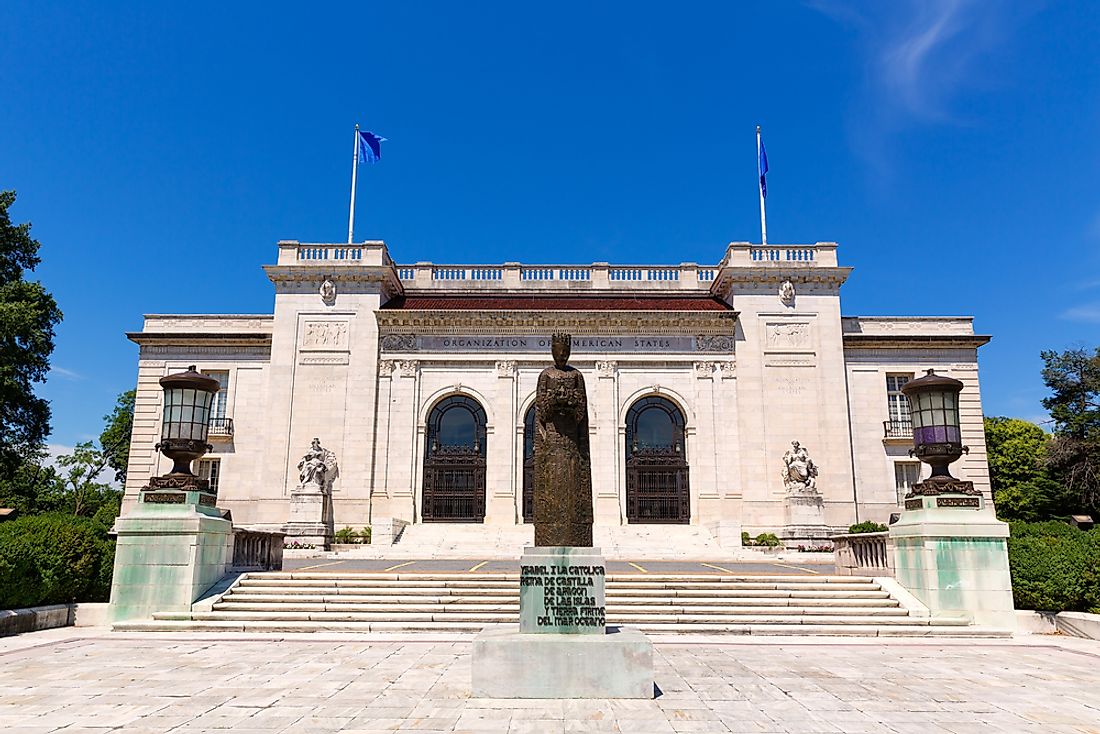The Organization Of American States (OAS)

The Organization of American States (OAS) is a regional organization that joins 35 member nations to promote their solidarity. By coming together under one unifying organization, members are committed to facilitating collaboration among themselves. Member countries are all located in the Americas, and they cite their founding principles as human rights, security, democracy, and development. The idea of an international union originated with Simon Bolivar in 1826 to unite Hispanic American nations. The idea failed with the start of the civil war in Colombia. The foundation of the OAS began with the International Union of American Republics in 1890, which had 18 members. With World War II, American nations realized they were not territorially protected against external aggressors. A treaty promising reciprocal assistance in the event of violence was signed in 1947 and a year later, 21 countries signed an agreement to prevent communism in the western hemisphere. April 30, 1948, was the official beginning of the OAS.
Goals, Achievements, Challenges, and Disputes
Goals and Objectives
The OAS works to ensure non-violent dispute settlements, to eradicate poverty, and to resolve economic or political problems where member states are involved. Since 1990, the organization has strengthened its efforts to promote democracy. Member nations have also led negotiations between quarreling countries and helped sweep for landmines placed over territorial disputes. They report on human rights infringements and are currently working to draft a free trade agreement that will include all American nations.
Achievements
Since its inception, the OAS has accomplished impressive milestones. In its first decade, the organization created both the Inter-American Commission on Human Rights and the Development Bank. In 1979, they established the Inter-American Court of Human Rights and in 2001, they adopted the Inter-American Democratic Charter.
Challenges
As with any international organization, the OAS faces many challenges to success. Many critics claim that the purpose of the OAS is now irrelevant, representatives from member states have even commented that they see no reason to continue periodic meetings. Latin American members criticize the OAS for being too US centered. US representatives question whether the US government should continue to provide the bulk of the funding.
Disputes
Disputes among member states have been few. Most notably perhaps is the Belize-Guatemala territorial dispute which dates back to colonial times. The disagreement had continued for more than 150 years and, in the search for a peaceful solution, both countries appealed to the OAS Peace Fund for help. The case was referred to the International Court of Justice and under the OAS, Belize and Guatemala signed 13 different agreements touching on areas of defense, transport, culture, migration, and social and economic development.
Current Projects
Although some member states question its functionality, it cannot be said that the OAS is inactive. One of its most recent projects began in 2015 and is ongoing. Together with the Organization for Economic Cooperation and Development, the OAS published the SICREMI report. This report is the Continuous Reporting System on International Migration in the Americas. International migration is a current public concern and one that requires detailed attention and tracking. In addition, the OAS has been increasing discussions and raising awareness of human rights issues of aging populations throughout the Americas. These policies are being accomplished together with the World Health Organization and the UN Economic Commission for Latin America and the Caribbean. With so many ongoing projects, the dissolution of the OAS seems unlikely.
The Organization Of American States (OAS)
| Rank | Organization Of American States (OAS) | Year Joined |
|---|---|---|
| 1 | Antigua and Barbuda | 1981 |
| 2 | Argentina | 1948 Founder |
| 3 | Bahamas | 1982 |
| 4 | Barbados | 1967 |
| 5 | Belize | 1991 |
| 6 | Bolivia | 1948 Founder |
| 7 | Brazil | 1948 Founder |
| 8 | Canada | 1990 |
| 9 | Chile | 1948 Founder |
| 10 | Colombia | 1948 Founder |
| 11 | Costa Rica | 1948 Founder |
| 12 | Cuba | 1948 Founder |
| 13 | Dominica | 1979 |
| 14 | Dominican Republic | 1948 Founder |
| 15 | Ecuador | 1948 Founder |
| 16 | El Salvador | 1948 Founder |
| 17 | Grenada | 1975 |
| 18 | Guatemala | 1948 Founder |
| 19 | Guyana | 1991 |
| 20 | Haiti | 1948 Founder |
| 21 | Honduras | 1948 Founder |
| 22 | Jamaica | 1969 |
| 23 | Mexico | 1948 Founder |
| 24 | Nicaragua | 1948 Founder |
| 25 | Panama | 1948 Founder |
| 26 | Paraguay | 1948 Founder |
| 27 | Peru | 1948 Founder |
| 28 | Saint Kitts and Nevis | 1984 |
| 29 | Saint Lucia | 1979 |
| 30 | Saint Vincent and the Grenadines | 1981 |
| 31 | Suriname | 1977 |
| 32 | Trinidad and Tobago | 1967 |
| 33 | United States | 1948 Founder |
| 34 | Uruguay | 1948 Founder |
| 35 | Venezuela | 1948 Founder |







